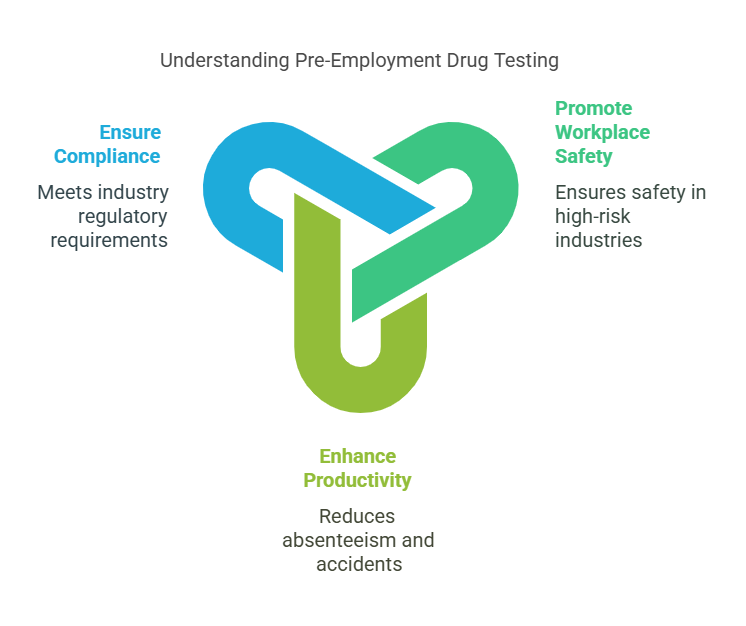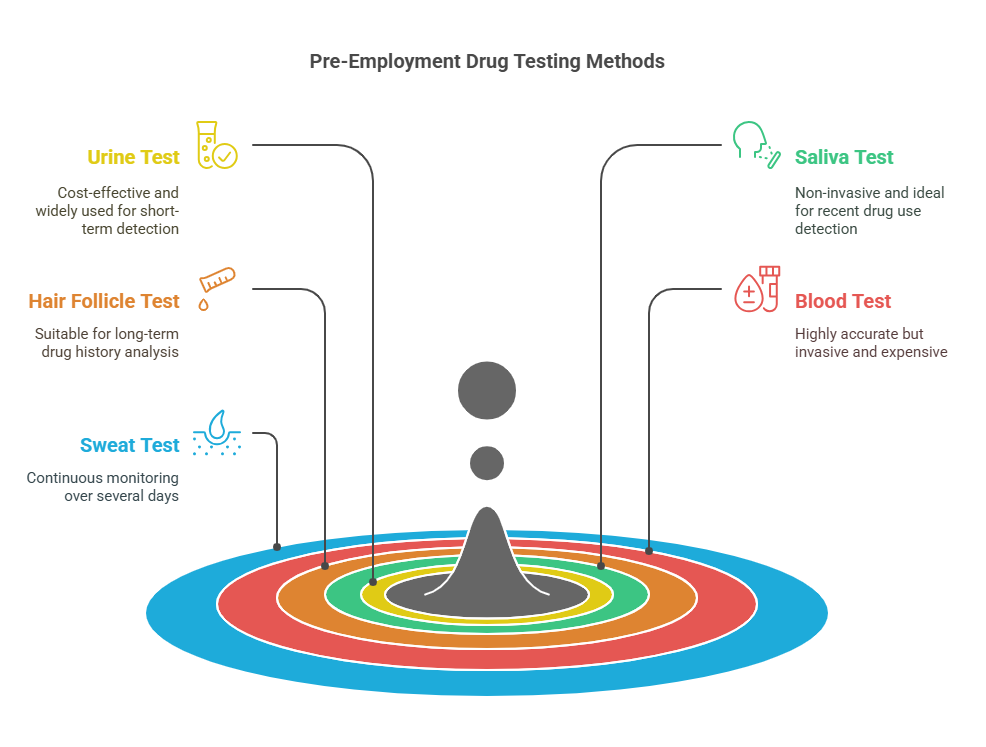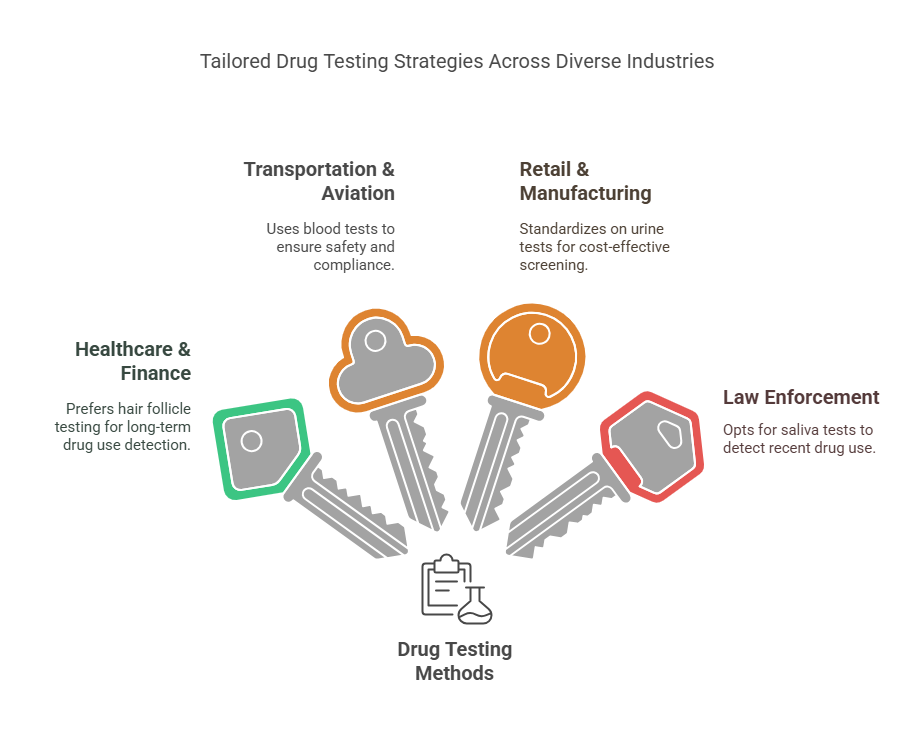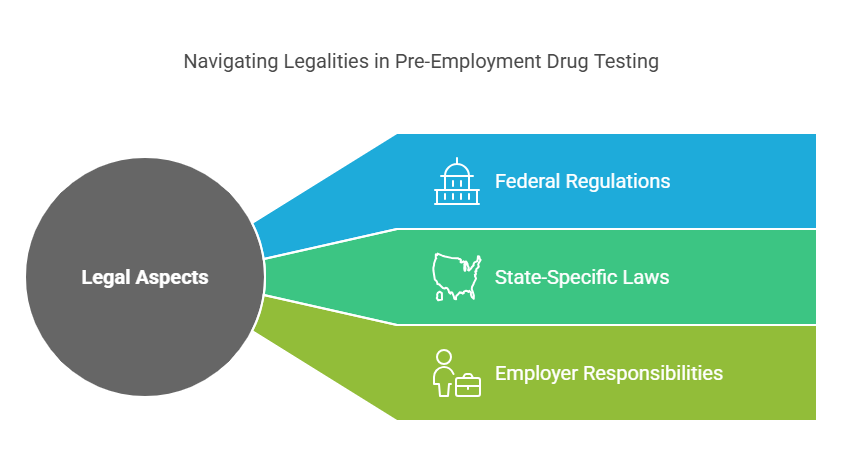Most Common Types of Pre-Employment Drug Testing

Overview of Pre-Employment Drug Testing
Pre-employment drug testing is a critical step in the hiring process for many organizations. It helps employers maintain a safe and productive work environment, reduce workplace accidents, and ensure compliance with federal and state regulations. By screening for drug use, companies can also foster a culture of accountability and trust while protecting their reputation.
In this article, we’ll explore the most common pre-employment drug test, the reasons behind its widespread use, and the substances typically screened. Understanding these aspects can help both employers and job applicants navigate the process with confidence.
What Is Pre-Employment Drug Testing?

Pre-employment drug testing is the process of screening job applicants for the presence of illegal or prescription drugs in their system before they are officially hired. Employers use these tests to:
- Promote workplace safety: Especially in industries like construction, transportation, and healthcare where impaired performance can endanger lives.
- Enhance productivity: Employees under the influence of drugs are more likely to be absent, unproductive, or involved in accidents.
- Ensure compliance: Certain industries, such as those regulated by the Department of Transportation (DOT), require mandatory drug testing for safety-sensitive roles.
Types of Pre-Employment Drug Tests

There are several types of drug tests employers may use during the hiring process. Each method has unique characteristics and is chosen based on the employer’s needs, the industry, and the job role.
- Urine Drug Test
- How It Works: The applicant provides a urine sample, which is analyzed for specific drug metabolites.
- Detection Window: Detects drug use within the past 1–5 days for most substances.
- Why It’s Used: Cost-effective, accurate, and widely accepted across industries.
- Saliva Drug Test
- How It Works: A swab is used to collect saliva from the mouth, typically from the cheek or under the tongue.
- Detection Window: Short-term use (24–48 hours).
- Why It’s Used: Non-invasive and useful for detecting recent drug use.
- Hair Follicle Drug Test
- How It Works: A small sample of hair is collected and tested for drug metabolites.
- Detection Window: Detects drug use over the past 90 days.
- Why It’s Used: Ideal for long-term drug history but not effective for recent use.
- Blood Drug Test
- How It Works: A blood sample is drawn and analyzed for active drugs in the system.
- Detection Window: Short-term use (hours to a few days).
- Why It’s Used: Provides highly accurate results but is invasive and expensive.
- Sweat Drug Test
- How It Works: A patch is worn on the skin to collect sweat over an extended period.
- Detection Window: Continuous monitoring over several days.
- Why It’s Used: Rarely used in pre-employment testing but suitable for ongoing monitoring.
The Most Common Pre-Employment Drug Test: Urine Drug Testing
The urine drug test is by far the most common pre-employment drug test used by employers. Its popularity stems from several factors:
- Cost-Effectiveness: Urine testing is one of the most affordable methods, making it accessible for businesses of all sizes.
- Accuracy and Reliability: Advanced testing technology ensures accurate results, reducing the likelihood of false positives or negatives.
- Widespread Acceptance: The urine drug test is recognized as a standard in pre-employment screening and complies with most industry regulations.
- Ease of Administration: Sample collection is simple and minimally invasive, ensuring quick and efficient testing.
Substances Typically Screened in Pre-Employment Drug Tests
Most pre-employment drug tests screen for a standard panel of substances. These commonly include:
- Marijuana (THC): The most frequently tested drug, even in states where it is legal.
- Cocaine: A powerful stimulant that poses safety risks in the workplace.
- Opiates: Including heroin and prescription painkillers such as oxycodone and hydrocodone.
- Amphetamines: Includes methamphetamine and medications like Adderall.
- Phencyclidine (PCP): A hallucinogenic drug with severe side effects.
Additional substances, such as alcohol, benzodiazepines, or barbiturates, may also be tested depending on the employer’s preferences or industry requirements.
Common Drug Testing Methods and Their Use Cases
Introduction
Employers rely on various drug testing methods to ensure a drug-free workplace and protect the safety, productivity, and reputation of their organizations. Each method has unique advantages, limitations, and suitability for specific roles or industries. In this section, we’ll explore the most common drug testing methods, their use cases, and why urine drug testing remains the top choice for pre-employment screening.
Comparison of Drug Testing Methods
The table below provides a side-by-side comparison of the most common drug testing methods based on key factors such as detection window, cost, accuracy, and typical use cases:
| Drug Test Method | Detection Window | Cost | Accuracy | Use Cases | Pros | Cons |
|---|---|---|---|---|---|---|
| Urine Test | 1–5 days (up to 30 days for marijuana) | Low | High | Most industries, including retail, office roles, and transportation | Cost-effective, widely accepted, and non-invasive | May detect only past, not current impairment |
| Saliva Test | 24–48 hours | Moderate | Moderate | Roles requiring immediate results or testing for recent use | Non-invasive and easy to administer | Short detection window |
| Hair Follicle Test | Up to 90 days | High | Very High | High-security or long-term positions (e.g., finance, healthcare) | Long detection period, tamper-proof | Expensive and cannot detect recent use |
| Blood Test | Hours to a few days | Very High | Very High | Safety-critical industries (e.g., aviation, law enforcement) | Highly accurate, detects current impairment | Invasive and expensive |
| Sweat Test | Continuous (days to weeks) | High | High | Ongoing monitoring or probation programs | Continuous monitoring | Rarely used in pre-employment testing |
In-Depth Overview of Each Method
1. Urine Drug Testing
Urine drug testing is the most widely used method due to its affordability, accuracy, and versatility. Employers from various industries, including retail, office-based roles, and transportation, prefer this test for pre-employment screening.
- Pros:
- Cost-effective for large-scale testing.
- Detects a wide range of substances.
- Compliant with federal regulations for safety-sensitive roles.
- Cons:
- Limited ability to detect current impairment.
- Some candidates may attempt to tamper with the sample.
2. Saliva Drug Testing
Saliva testing is ideal for detecting recent drug use, making it popular in roles where immediate results are necessary, such as law enforcement or post-accident testing.
- Pros:
- Non-invasive and easy to administer.
- Provides quick results.
- Cons:
- Short detection window (limited to recent use).
- May not detect certain substances as effectively as urine or blood tests.
3. Hair Follicle Drug Testing
This method is often used for roles requiring a detailed review of an applicant’s long-term drug use history. It is especially common in industries like finance, healthcare, and government positions.
- Pros:
- Provides a 90-day history of drug use.
- Difficult to tamper with results.
- Cons:
- Expensive compared to other methods.
- Cannot detect drug use within the past 7 days.
4. Blood Drug Testing
Blood tests are the most accurate for detecting recent drug use and are often used in safety-critical roles, such as aviation, transportation, or emergency services.
- Pros:
- Highly reliable for detecting current impairment.
- Suitable for identifying active substances in the bloodstream.
- Cons:
- Invasive and costly.
- Requires professional administration in a medical setting.
5. Sweat Drug Testing
Though less common in pre-employment screening, sweat testing is used for continuous monitoring in probation or rehabilitation programs.
- Pros:
- Ideal for long-term monitoring.
- Difficult to tamper with.
- Cons:
- Rarely used in pre-employment contexts.
- Expensive and time-consuming.
Industry-Specific Preferences for Drug Testing

Different industries prioritize certain drug testing methods based on their unique needs. Below are some examples:
- Healthcare and Finance: Hair follicle testing is often preferred due to its ability to reveal long-term drug use, ensuring the trustworthiness of employees in sensitive roles.
- Transportation and Aviation: Blood tests are common for safety-sensitive roles to detect current impairment and comply with DOT regulations.
- Retail and Manufacturing: Urine tests are the standard for pre-employment screening due to their affordability and effectiveness in detecting common substances.
- Law Enforcement: Saliva tests are frequently used for their ability to detect very recent drug use.
Why Urine Drug Testing Remains the Most Common Method
Despite the availability of advanced testing methods, urine drug testing remains the gold standard for pre-employment screening. Here’s why:
- Cost-Effectiveness: Employers can conduct large-scale testing without straining budgets.
- Regulatory Compliance: Urine testing meets the requirements of federal agencies like the DOT, making it suitable for regulated industries.
- Widespread Availability: Testing facilities nationwide are equipped to perform urine tests, ensuring convenience for employers and candidates.
Partnering with Exact Background Checks for Drug Testing
At Exact Background Checks, we provide accurate, reliable, and compliant drug testing solutions tailored to employer needs. Our services include:
- Access to various testing methods, including urine, saliva, hair follicle, and blood tests.
- Expert guidance on selecting the appropriate drug testing method for your industry and role.
- Fast, confidential results delivered securely to ensure efficiency in your hiring process.
Legal Aspects of Pre-Employment Drug Testing

When conducting pre-employment drug tests, employers must adhere to various legal regulations to ensure fairness, compliance, and respect for candidates’ rights. These regulations vary depending on federal laws, state-specific rules, and industry requirements. Here’s an overview of the legal framework governing pre-employment drug testing.
Federal Regulations
- Department of Transportation (DOT) Regulations
- Employers in safety-sensitive industries, such as aviation, trucking, and public transportation, must comply with DOT drug testing requirements.
- DOT requires urine drug tests as the standard method and mandates testing for substances such as marijuana, cocaine, opiates, amphetamines, and PCP.
- Americans with Disabilities Act (ADA)
- The ADA prohibits discrimination against candidates with disabilities, including those undergoing treatment for drug addiction.
- Employers cannot disqualify candidates solely based on past addiction or participation in a rehabilitation program.
- Fair Credit Reporting Act (FCRA)
- The FCRA applies when employers use third-party services to conduct drug tests.
- Employers must obtain written consent from the applicant and provide a copy of the results if adverse action (e.g., rescinding a job offer) is taken based on the test.
State-Specific Laws
State laws governing pre-employment drug testing can vary widely. Some states impose strict requirements, while others grant employers greater flexibility.
- Marijuana Use in Legalized States
- In states where recreational or medical marijuana is legal, employers may face restrictions on testing for THC or disqualifying candidates based on marijuana use outside the workplace.
- However, federal law still classifies marijuana as a Schedule I substance, which may override state laws in certain industries.
- Consent and Notification Requirements
- Many states require employers to inform candidates about pre-employment drug testing policies upfront.
- Some states mandate a clear explanation of the consequences of refusing a drug test or testing positive.
- Time Limits and Retesting
- Certain states allow candidates to request a retest if they dispute the results of a drug test. Employers must follow proper procedures to accommodate such requests.
Employer Responsibilities
To remain compliant with drug testing laws, employers should:
- Establish Clear Policies: Draft and communicate a comprehensive drug testing policy that outlines procedures, substances tested, and consequences of positive results.
- Obtain Consent: Always secure written consent from candidates before conducting a drug test.
- Maintain Confidentiality: Handle test results securely and share them only with authorized personnel.
- Avoid Discrimination: Apply drug testing policies consistently to all candidates to avoid claims of bias or unfair treatment.
Frequently Asked Questions (FAQs)
What are the primary reasons employers conduct pre-employment drug testing?
Employers conduct pre-employment drug testing to:
- Promote workplace safety.
- Enhance productivity.
- Ensure compliance with regulations.
What are the most common types of pre-employment drug tests, and which is the most widely used?
Common types include:
- Urine Drug Test
- Saliva Drug Test
- Hair Follicle Drug Test
- Blood Drug Test
- Sweat Drug Test
What substances are typically screened for in pre-employment drug tests?
Common substances include:
- Marijuana (THC)
- Cocaine
- Opiates
- Amphetamines
- Phencyclidine (PCP)
Additional substances like alcohol, benzodiazepines, or barbiturates may also be tested.
What are some key legal aspects employers must consider when conducting pre-employment drug testing?
Employers must consider:
- Department of Transportation (DOT) regulations for safety-sensitive roles.
- Americans with Disabilities Act (ADA) provisions regarding past addiction.
- Fair Credit Reporting Act (FCRA) requirements for third-party testing.
- State-specific laws, especially regarding marijuana use.
- Consent and notification requirements.
Why does urine drug testing remain the most common method despite the availability of other tests?
Urine drug testing remains common because of its:
- Cost-effectiveness.
- Regulatory compliance (e.g., DOT).
- Widespread availability of testing facilities.
What are the primary reasons employers conduct pre-employment drug testing?
Employers conduct pre-employment drug testing to:
- Promote workplace safety.
- Enhance productivity.
- Ensure compliance with regulations.
What are the most common types of pre-employment drug tests, and which is the most widely used?
Common types include:
- Urine Drug Test
- Saliva Drug Test
- Hair Follicle Drug Test
- Blood Drug Test
- Sweat Drug Test
What substances are typically screened for in pre-employment drug tests?
Common substances include:
- Marijuana (THC)
- Cocaine
- Opiates
- Amphetamines
- Phencyclidine (PCP)
Additional substances like alcohol, benzodiazepines, or barbiturates may also be tested.
What are some key legal aspects employers must consider when conducting pre-employment drug testing?
Employers must consider:
- Department of Transportation (DOT) regulations for safety-sensitive roles.
- Americans with Disabilities Act (ADA) provisions regarding past addiction.
- Fair Credit Reporting Act (FCRA) requirements for third-party testing.
- State-specific laws, especially regarding marijuana use.
- Consent and notification requirements.
Why does urine drug testing remain the most common method despite the availability of other tests?
Urine drug testing remains common because of its:
- Cost-effectiveness.
- Regulatory compliance (e.g., DOT).
- Widespread availability of testing facilities.
Conclusion
Pre-employment drug testing is a crucial component of the hiring process, helping employers ensure workplace safety, productivity, and compliance with legal regulations. Among the various testing methods, urine drug testing remains the most common due to its affordability, accuracy, and widespread acceptance.
Employers must also navigate complex legal requirements, including federal and state laws, to conduct drug tests ethically and responsibly. By establishing clear policies, obtaining proper consent, and maintaining compliance, companies can conduct effective drug testing while respecting candidates’ rights.
At Exact Background Checks, we specialize in providing comprehensive, reliable, and compliant pre-employment drug screening services. Whether you need assistance choosing the right testing method or navigating legal requirements, our team is here to help. Contact us today to streamline your hiring process with confidence.



